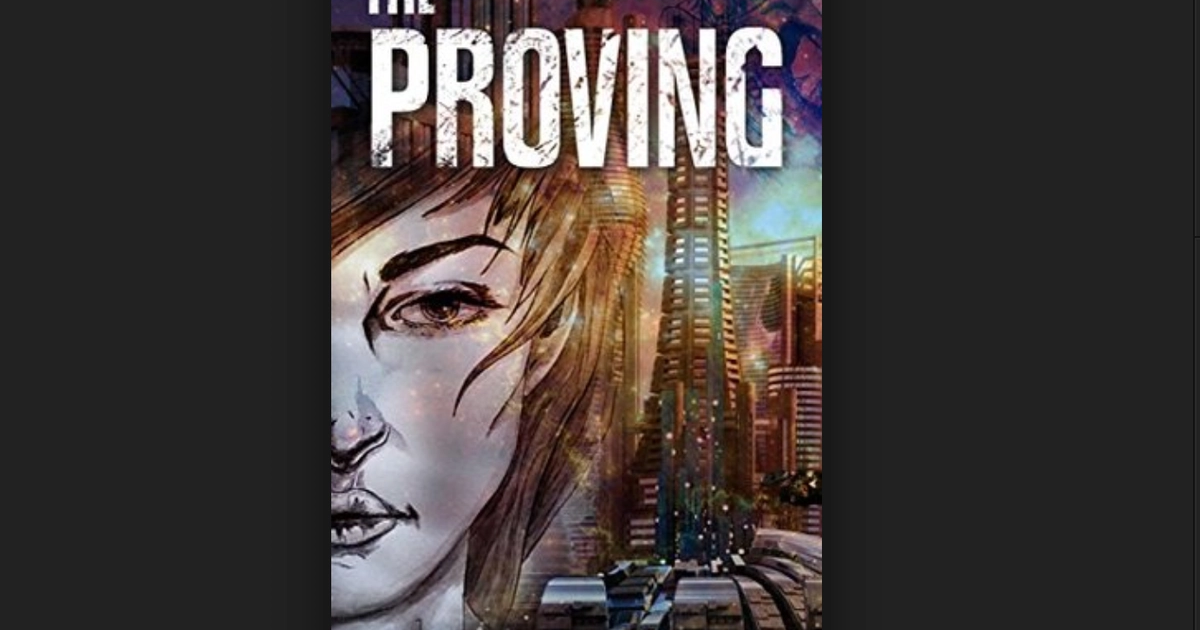The Proving is a part of Ken Brosky's sci-fi adventure series titled The Earth-X Chronicles.
When Brosky picked up a copy of Michio Kaku's book Physics of the Future, he was absolutely enthralled with it. Not just the things it predicted to happen in the future, but also the stuff that scientists are already working on. At the time, Brosky had been reading a lot of sci-fi graphic novels like Saga and Injection and books like Oryx and Crake. After running out of good sci-fi movies to watch, he wanted to combine his love of sci-fi and horror and Young Adult fiction into this unique story with believable science and a strong focus on setting. Exploration of the familiar.
Here's the official synopsis:
It's been 133 years since the Specters invaded Earth. Like ghosts they haunt the planet, devouring anyone foolish enough to venture outside the last remaining protected cities. For some, venturing out isn't a choice--it's a necessary evil to prove yourself to your clan as you come of age.
But when a team of ambitious youth—New Adults—undertake a mission deep in Specter territory, they discover a terrible secret. Everything they've learned may be wrong ... and Earth is in grave danger.
Interview with Ken Brosky
What do you think is the most exciting part of the New Adults' mission?
This kind of a play on the type of thing you see in a lot of Young Adult novels: young people placed in a situation they have no business being in (think Hunger Games, The Maze Runner, etc.). Only in the case of The Proving, these missions really should only have one purpose: to give young people an opportunity to experience the world beyond the safety of the city shields. A world where alien ghosts roam like lost souls. Even so, the missions are supposed to be pretty safe. Simple. Routine. But that isn't always the case ...
It sounds like there's a deeper mystery involved that you're not telling us. How do you think your readers will react to the secret's revelation?
As you grow up, you learn that the truth is a lot trickier than you've been led to believe. Especially here in the United States, students move through primary and secondary education taking notes and regurgitating information on tests that are supposed to measure a lot of different things. It isn't until you start questioning what you've learned that you take your first real steps into adulthood.
I sense that Gabriel Martinez is a complex protagonist. What is his personal motive? How is he different from the other members of the New Adults?
Gabriel's special. He's the son of a Very Important Person, and he and his teammates know it. He enjoys special privileges, which he resents. As much as he hates the alien scourge, he still doesn't fully understand just how dangerous the Specters truly are.
You mentioned that in 'Physics of the Future' that there are things that scientists are currently working on now that fascinated you. Did you include any of those concepts in 'The Proving'?
Oh yeah. Smartglasses, gene therapy, magnetic rails to eliminate friction, futuristic weapons, food printers ... you name it. And in future books, we'll see some of these technologies breaking off in different ways. Exploration will reveal just how drastically a few events can change the course of human evolution.
Name some authors who have influenced your writing style
Margaret Atwood and Isaac Asimov come immediately to mind. But also literary writers like Jim Shepard and Karen Russell and Neil Gaiman. My favorite comic of all-time is Grendel by Matt Wagner, but I'm also influenced by the Generation-X series, too.
Tell us about the world of your novel. How did you develop this setting?
A lot of the futuristic Earth resembles our planet now, save for technological breakthroughs. Oh, and there's the alien ghosts, I suppose. Everyone lives in shielded cities, and machines take care of the crops outside of the shields. Travel is possible, since the Specters mostly come out at night (mostly!), but limited to mag-rail trains. The society is less Euro-centric than you find in most sci-fi books. The main characters are a mix of races with a mixture of beliefs. One of the most popular social events is Carnivale, which is based on a number of historical celebrations all around the world. I think sci-fi as a genre does itself a huge disservice when all of the main characters are white people who clearly adhere to American values and ideals. The world is complex ... a futuristic society should reflect this.
Why do you think technology is an important element of your novel? How does it tie to the plot?
In order to stay one step ahead of the Specters, humanity's made some tough sacrifices. One of those is the freedom to MOVE. Everyone is stuck inside the big, shield-protected cities. This technology isn't based on much ... but they're powered with a futuristic form of nuclear fusion. That's getting closer every day. Go on Google and look up the most recent nuclear fusion tests in Germany. It's exciting stuff. Sci-fi should be exciting. It should examine humanity's relationship with technology, for better or worse.
The Specters are intriguing. What do you think they represent to the various societies?
Some people believe they're ghosts. Some people have conducted limited studies and know the Specters are something a little more concrete, but answers are elusive. Testing is forbidden. So without much to go on, there's a lot of speculation and fear and rumors. We fear what we don't understand--that's a human condition. The real question humans need to ask is this: what happens when the truth the worse than the lie?
Check out The Proving on Amazon.
Explore new topics and discover content that's right for you!







